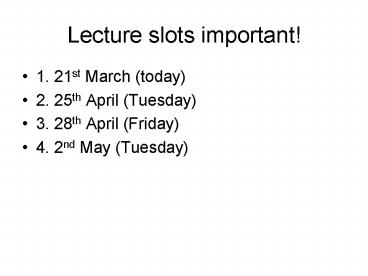Lecture slots important - PowerPoint PPT Presentation
1 / 20
Title:
Lecture slots important
Description:
This shift towards political economy approaches was paralleled by a shift away ... In turn this political economy approach came under fire too. It was criticised for: ... – PowerPoint PPT presentation
Number of Views:13
Avg rating:3.0/5.0
Title: Lecture slots important
1
Lecture slots important!
- 1. 21st March (today)
- 2. 25th April (Tuesday)
- 3. 28th April (Friday)
- 4. 2nd May (Tuesday)
2
Geographical Economies
- The new economic geography
- Service work
- Retail Geography
- Consumption
3
The new economic geography
- Economic geography dates back to commercial
geography in the nineteenth century - In early 1960s economic geography became a
primary vehicle through which a new way of doing
geography became popular - The quantitative revolution refashioned geography
as a theoretical discipline
4
The new economic geography
- Geographers sought to explain the spatial
organisation of economic activity rather than
just describe and map it. - It developed as a positivist discipline which
aimed to accurately predict observed spatial
patterns. - It seemed to suit this agenda well it could be
easily quantified and there were well developed
theories from economists and geographers such as
von Thunen, Weber, Christaller and Losch) who
were using models to predict the location of
economic activity on the basis of rational
economic decision making.
5
Economic Geography
- Initial research developed statistical methods to
test location theories. - A rich research programme developed and a new
interdisciplinary field of study regional
science
6
Early critique
- But many of the methods and assumptions on which
this quantitative approach were based have been
met with considerable critique - Rational decision making?
- Least cost locations?
- Economic man?
- Based on manufacturing industry
7
1970s onwards
- Disillusionment with classical location models
led to a growing influence of political economy
approaches. Inspired by Karl Marx, this approach
focused on how the political and economic forces
of capitalism shape the geography of the economy. - Geographical landscapes seen not as in harmonious
equilibrium but as the outcome of class
inequality (David Harvey, Doreen Massey, Michael
Storper, Richard Peet). Emergence of a radical
agenda in economic geography
8
Shift in methods too
- This shift towards political economy approaches
was paralleled by a shift away from statistical
modelling techniques and quantitative methods
towards a more qualitative case study approach.
9
Late 1980s-1990s
- In turn this political economy approach came
under fire too. It was criticised for - 1. over-emphasising the importance of economic
forces relative to culture - 2. underplaying the importance of human agency in
shaping socio-spatial structures - 3. Not considering gender (Linda McDowell, Doreen
Massey, Gibson-Graham)
10
Diversity of approaches
- This criticism resulted again in a new diversity
of approaches in economic geography, including
feminist approaches, cultural theoretic
approaches and a focus on more anthropological
methods (ethnography)
11
The new economic geography
- During the 2000s there is evidence of what we can
call a new economic geography. - The key questions we are posing are still
remarkably similar - Economic geographers have always been interested
(and still are) in why, where, when, how and by
whom things are produced and consumed food,
commodities, clothes, music, landscapes.
12
New questions too
- What do we mean by the term production?
Consumption? Work? Service? - The boundaries of economic processes do not
conveniently coincide with those of firms, or
labour markets, or the census, or area
boundaries. So, for example, a focus on wages
work can obscure the role of the household as a
place of production, and the role of social
reproduction as (unpaid) work raising kids. It
can neglect the role of women in the economy, and
of hidden kinds of employment.
13
The new economic geography agenda
- Grew out of the redundancy and irrelevancy of
much traditional economic geography location
theory - Grew too out of dissatisfaction with some of the
positivist methods (statistics, modelling) - Partly due to turbulent changes in the world
globalisation, tertiarisation, multinationals,
time space compression. A very different world,
and thus needed very different ways to understand
it. - Finally, due to a problematisation of what the
economic is it is as much concerned with
cultural as with economic processes.
14
Contd.
- Increasing acknowledgement that the boundaries
between the economic and the cultural are
blurring. Often called the cultural turn in
economic geography. - Work, for example, isnt simply about exchanging
our labour for money. It is also deeply social
and cultural - So a distinct sense of reappraisal
15
Key economic changes
- It is widely agreed that something dramatic has
been happening in our economies since the late
1970s. Rapid and far reaching changes including - Globalisation (Peter Dicken, Amin Thrift)
shrinking world, time-space compression, complex
borderless world. McDonalds as iconic symbol
16
Relocalisation
- Occurring at the same time as globalisation a
renewed emphasis on local places, embeddedness,
agglomeration. Continued importance of world
cities geography remains significant still
17
Large firms and multinationals
- International division of labour
- Global food and fashion
- Export Processing Zones
- Branch plants
18
Information economy
- Information society
- Clusters silicon valley, city of london
- Knowledge economy
- IT, internet, digital divide
- Call centres
19
Tertiarisation
- Growth of service work the dominant sector
- Feminisation of workforce
- Polarisation (top end jobs and poor service
jobs servicing the middle classes). - Importance of gender, embodiment and performance
in the workplace (Linda McDowell)
20
Retailing
- At the forefront of many shifts
- Redefining our urban spaces malls, arcades,
shopping centres - New forms of consumption, mediated via technology
ebay, amazon































